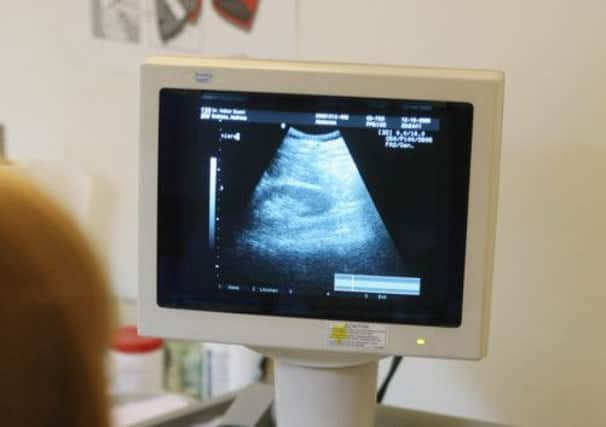‘Have babies by age of 35’ say experts


A panel of doctors speaking at a major science festival yesterday said women should aim to start their families before the age of 35, as fertility declines sharply after this point.
But others said having babies was not as simple as just choosing a date in your late twenties, with factors such as jobs and finding the right partner also critical.
Advertisement
Hide AdAdvertisement
Hide AdSpeaking at the British Science Festival in Newcastle, the experts said there was a mistaken belief that procedures such as IVF could prolong fertility.
And they said women were deciding to delay having children without knowing the risks that may mean they could be unsuccessful.
Mary Herbert, professor in reproductive biology at the University of Newcastle, said there was no way of reversing declining fertility.
“What we can say for sure is that reproductive technologies do not do much to buy time,” she said. “Perhaps the most important message to give is that the best cure of all is to have your babies before this clock strikes 12.
“I would be getting worried about my daughter if she hadn’t had a child by 35.”
She advised all women “to think about family planning in the context of not just preventing pregnancy but also in the context of having your babies at a time when you still have your reproductive fitness”.
Dr Jane Stewart, a clinician who treats IVF patients, also speaking at the conference, agreed that if women wanted a “very good chance of having a child”, they should start trying before 35.
She said a woman’s family planning should involve thinking about when to have children, not just avoiding unwanted pregnancy.
Advertisement
Hide AdAdvertisement
Hide Ad“It’s not for us to make choices for other people – you have to make choices about when it’s the right time for you,” she said. “It’s making sure you’re equipped with the knowledge to make those priority choices.”
In the past few decades, there has been an increase in the average age of mothers giving birth in Britain, from about 27 in 1986 to 29 in 2008. The number of mothers aged 35 to 39 increased from 6.8 per cent to 17 per cent over the same period.
In Scotland, births to older mothers have also risen in the past three decades. Since 1976, the proportion of mothers aged over 35 increased from 6 per cent to 19.9 per cent in 2011-12.
The experts said the decline in fertility and increase in risks for older mothers was due to the fact that all women’s eggs began to age and die even before they themselves were born.
Women are born with a pool of one to two million eggs that shrinks until, at the menopause, the eggs effectively run out.
However, it is not only the number but the quality of eggs that is reduced by the passing years. Over time, eggs can end up with too many or too few chromosomes – the strands of packaged DNA that contain our genes. The chromosomal abnormalities lead to infertility, stillbirth or birth defects such as Down’s syndrome.
Prof Herbert – one of Britain’s top experts on reproductive ageing – said she was certain there was little chance of medicine finding a way of reversing this.
One answer could be for women to freeze their eggs for future IVF, the panel said. However, this is not available on the NHS, except in cases where patients will lose their fertility due to treatment for cancer.
Advertisement
Hide AdAdvertisement
Hide AdThe reasons behind putting off pregnancy were likely to be a combination of factors such as high child-care costs and worries about careers, the science festival heard.
“Women tell me it’s their career,” Prof Herbert said. “In a sense I think that’s misguided, because there’s no career where it gets less busy as you go on.” She said she thought it was something society needed to address as well as individual women, who were not being properly informed.
“I think it goes beyond the message to women,” she said. “It goes to the message to policy- makers. We need to understand what the barriers are to women having their children early.”
Professor Judith Rankin, from the Institute of Health and Society at the University of Newcastle, said: “I don’t think women understand the risks there may be when they reach older ages.
“There is quite good evidence about some of these outcomes, and for me, the whole driver for antenatal care in this country is about informed choice.
“How can women make an informed choice if they’re not being told the risks?”
Campaigners said each woman had different reasons for deciding when to have a baby. Susan Seenan, deputy chief executive of patient charity Infertility Network UK, said: “There are many complex reasons why women sometimes have a baby in their late thirties.
“Over 3.5 million people in the UK suffer from some kind of infertility problem and for them the journey to possible parenthood can be a long one, without always having a happy ending.
Advertisement
Hide AdAdvertisement
Hide Ad“People who find themselves struggling to conceive need our help and understanding, because it is a problem which can be devastating for couples.”
Belinda Phipps, chief executive of the National Childbirth Trust, added: “You can’t always have babies to order. If you want to have a partner and a secure place to live you don’t necessarily get that all done by the time you are 32. The right man doesn’t always just come along.”
Ms Phipps said women knew their fertility might decline after 35, but many went on to have children past this age. “If you are well and look after yourself, so long as you’re fertile, it really makes no difference,” she said.